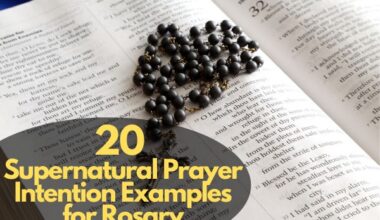Table of Contents Show
Embarking on a journey of prayer after confession opens a sacred door to introspection, healing, and spiritual alignment. It transcends a mere ritualistic act; it’s a profound connection between the human soul and the divine. In this guide, we embark on an exploration, looking into the depths of What To Pray After Confession. Beyond words, beyond tradition, it’s an intimate conversation where vulnerability meets divinity, offering solace, growth, and renewal.
What To Pray After Confession
After experiencing the transformative act of confession, it is essential to continue our spiritual journey with a sense of renewal and deepened connection with the divine. One way to nurture this connection is through post-confession prayers, which allow us to express our gratitude, seek guidance, and strengthen our faith. In this article, we will explore the significance of post-confession prayers and provide a comprehensive guide on what to pray after confession.
The Power of Post-Confession Prayers
Post-confession prayers hold immense power and significance in the realm of spiritual and personal growth. They provide an opportunity for individuals to deepen their connection with the divine, seek forgiveness, and embark on a path of transformation.
Healing and Emotional Release: Post-confession prayers offer a space for healing and emotional release. Confession itself is a process of acknowledging mistakes and seeking forgiveness, which can bring about a sense of relief and liberation. Engaging in prayer after confession further facilitates the release of guilt, shame, and burdens associated with past actions. By expressing genuine remorse and seeking forgiveness from the divine, individuals can experience emotional healing, inner peace, and a renewed sense of self.
Strengthening the Connection with the Divine: Prayer is a powerful tool for cultivating a deeper connection with the divine. After confession, engaging in heartfelt prayers allows individuals to strengthen their bond with the higher power they believe in. It creates an avenue for open and honest communication, fostering a sense of intimacy and trust. Through sincere prayers, individuals can experience a profound sense of being heard, understood, and guided by the divine presence in their lives.
Recommended Prayers After Confession
Prayer of Thanksgiving: Expressing gratitude for the opportunity to seek forgiveness and for the divine mercy received during the confession process.
Prayer for Guidance: Seeking divine guidance to lead a righteous and virtuous life, making choices aligned with the teachings of our faith.
Prayer for Strength: Asking for the strength to resist temptation and overcome challenges that may hinder our spiritual progress.
Prayer for Forgiveness: Humbly seeking continued forgiveness for any lingering sins or transgressions, acknowledging our imperfections.
Prayer for Transformation: Requesting divine assistance in transforming our hearts and minds, allowing us to grow closer to the divine and embody virtues.
Prayer for Healing and Reconciliation: Praying for healing of relationships and reconciliation with those we may have harmed in the past.
Prayer for Renewed Commitment: Renewing our commitment to following the teachings of our faith and living a life of righteousness.
Prayer for Others: Interceding on behalf of others, seeking blessings, healing, and guidance for our loved ones and the community.
Prayer for Peace: Asking for inner peace, serenity, and tranquility in our hearts and minds.
Prayer for Divine Protection: Seeking divine protection from negative influences and harm, both seen and unseen.
Prayer for Continued Growth: Praying for ongoing growth and spiritual progress, seeking to deepen our relationship with the divine.
Prayer for the Strength to Forgive: Requesting the strength to forgive others who may have wronged us, extending the same mercy we have received.
Prayer for Graciousness: Asking for the ability to be gracious and compassionate towards others, promoting harmony and understanding.
Prayer for Wisdom: Seeking divine wisdom to make wise decisions and discern between right and wrong.
Prayer for a Loving Heart: Praying for a heart filled with love and compassion, embracing the teachings of our faith and spreading kindness to others.
Ways to Cultivate a Genuine and Heartfelt Conversation with the Divine After Confession
Cultivating a genuine and heartfelt conversation with the divine after confession is a deeply personal and individual experience. Here are some suggestions to help you create a meaningful connection during your post-confession prayers:
Create Sacred Space: Find a quiet and peaceful space where you feel comfortable and undisturbed. This can be a designated area in your home or a natural setting that resonates with you. Creating a sacred space helps set the intention for your conversation with the divine.
Center Yourself: Take a few moments to calm your mind and center yourself. You can do this through deep breathing, meditation, or any other grounding practice that helps you connect with your inner self. Allow yourself to let go of distractions and be fully present in the moment.
Express Gratitude: Begin your conversation by expressing sincere gratitude for the opportunity to seek forgiveness and experience spiritual renewal. Reflect on the blessings in your life and the guidance provided during the confession process. Cultivating an attitude of gratitude opens your heart and sets a positive tone for your conversation.
Speak from the Heart: Approach your prayers with authenticity and sincerity. Instead of focusing on reciting specific words or phrases, speak from your heart. Share your genuine emotions, thoughts, and intentions with the divine. Be honest about your regrets, remorse, and desires for personal growth.
Seek Forgiveness and Guidance: Ask for forgiveness from the divine for your actions. Acknowledge any harm caused to yourself or others, and express genuine remorse. Seek guidance and strength to help you overcome challenges, make positive changes, and stay on the path of righteousness. Be open to receiving insights and wisdom during this conversation.
The Misconception
One misconception that often arises is the belief that there are specific prayers that must be recited after confession. Some individuals may feel compelled to find a prescribed set of words or prayers to follow, assuming that certain phrases or rituals are necessary for absolution or to fully complete the confession process.
Clarifying the Misconception
In reality, there is no fixed prayer or set of words that must be recited after confession. The purpose of confession is to sincerely express remorse, seek forgiveness, and commit to making positive changes in our lives. It is a deeply personal and individual experience that should be guided by genuine emotions and intentions.
Conclusion
After the profound experience of confession, engaging in post-confession prayers allows us to maintain a state of repentance, express gratitude, seek guidance, and strengthen our faith. These prayers offer an opportunity to deepen our connection with the divine and continue our spiritual journey with renewed purpose. By incorporating prayers of thanksgiving, guidance, strength, forgiveness, and transformation into our post-confession routine, we can nurture our relationship with the divine and grow in righteousness.
Frequently Asked Questions
1. Can I recite post-confession prayers in any language?
Yes, you can recite post-confession prayers in any language that you are comfortable with. The most important aspect is the sincerity and intention behind the prayers.
2. How often should I engage in post-confession prayers?
There is no set frequency for post-confession prayers. It is recommended to incorporate them into your regular prayer routine, ensuring that you continue to seek guidance and strengthen your faith.
3. Are there specific prayers for different religious traditions?
Yes, different religious traditions may have specific prayers associated with post-confession. It is advisable to consult with your religious leaders or refer to religious texts for guidance on prayers that align with your faith.







